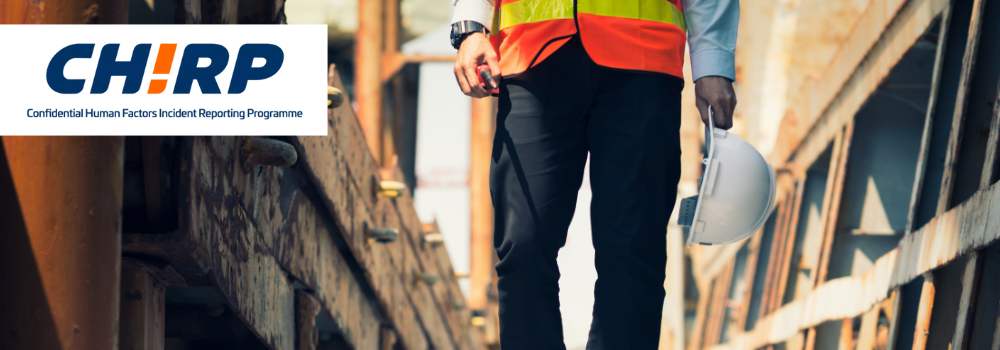We asked Director Maritime at CHIRP, Adam Parnell to give us a little bit of an insight as to what a week in the life at CHIRP looks like. CHIRP is an independent and impartial charity dedicated to improving safety in the air and at sea. Their confidential human factors incident reporting system empowers people working in the maritime and aviation sectors to share their safety concerns without the fear of being identified.
Monday
We work from home, so the week starts with a video call to my co-worker, Dave who lives on the other side of the country. At any one time we’re dealing with several safety reports received from seafarers around the world, so we frequently e-meet to collaborate on reports.
Last week we’d been contacted by a vessel’s crew who had been ordered to undertake a lengthy charter even though the company had yet to order or embark any victuals. The crew had apparently also not been paid for several months, so they felt trapped. We decided to escalate this to the vessel’s Flag state, and request that they intervene.
We also discussed a report from a seafarer who witnessed their master angrily ordering an engineering cadet to enter an enclosed space without completing the correct pre-entry checks beforehand because “they take too long”. We’re concerned about the vessel’s safety culture and agree to raise this with the company/s DPA and ask them to investigate. We also have a report about crew working at height without safety harnesses, and I contact the reporter for more information.
Tuesday
I start early because I have a call with people in New Zealand regarding a fishing safety project they’re developing. I spend most of the morning uploading our latest FEEDBACK newsletter to our website and social media sites. It takes some time, because it’s published in 8 different languages, but the steadily increasing reader numbers make it worthwhile.
Just before lunch I get an email from the company that we contacted yesterday about the cadet bullied to enter an enclosed space. They have started an investigation but want to know the reporter’s name to understand why they didn’t use the company’s own internal reporting system, and to get more details about the incident. I explain that some people are fearful of internal reporting systems for fear of reprisals, which is why we always protect our reporters’ identities. I know they’re not entirely happy, but I point out that our role is to improve safety and ask them to view us as a part of their safety system – after all, they wouldn’t have known about the incident if we hadn’t contacted them!
After lunch I dial into the CHIRP weekly meeting to catch up with our colleagues running the Aviation programme. Despite the transport modes being very different, it’s always remarkable how similar the safety trends and issues are across them both: fatigue, distraction and situational awareness are universal issues it seems!
Later that afternoon I’m contacted by someone interested in joining our CHIRP ambassador network. Currently we’ve got about 80 volunteers in 38 countries who help us raise awareness of safety concerns. They’re a very active group, and barely a day goes by without someone asking for advice, support or information on the WhatsApp group. It’s humbling to witness and be part of the exchange of ideas and experiences in real time.
Wednesday
Today I’m travelling into London to attend a multi-agency fishing safety meeting. On the way up, Dave calls me to say that we’ve received a bunch of reports from a company keen to share their safety learning with us. They’re mostly near-misses, and he’s going to be busily adding them to our database throughout today. Several organizations choose to share their reports with us, which we welcome because they help us build a better understanding of incident rates and incident causes. I’ve also had a reply about the yacht crew working at height, and seek the advice of our Superyacht Advisory Board. The Board is made up of experienced people who are currently active within the sector, and who we turn to when analysing a report to ensure that we properly understand the operating context as well as provide the right advice back to the reporter. Along with our other Maritime Advisory Board, we have access to over 1000 years of experience and expertise across all fields of the maritime industry. Their contribution to CHIRP is immeasurable.
On the train back home that evening, I prepare for tomorrow’s webinar, which is about ensuring safety during the industry decarbonization and its transition to new fuels.
Thursday
Today I’m a panellist on a maritime safety webinar. It’s a pre-recorded event that will be published in a few weeks’ time. It’s always an honour to be invited to present the CHIRP perspective, and I always come away with fresh insights from the other guests.
The Flag state investigating the vessel that had inadequate food has updated us, and along with several other issues that they discovered when they inspected, enough food has now been embarked and the vessel has been permitted to sail. I’ve also heard back about the yacht crew member who had been seen working at height without a safety harness. I’m saddened to hear that they’d been sent home, which is regrettably the ‘easy’ answer taken by companies when safety incidents occur. I’d have liked to see the vessel’s management instead take the harder road and review their safety procedures and levels of supervision that enabled this to occur in the first place. All of us at CHIRP consistently encourage the adoption of a ‘just’ culture which seeks answers, not scapegoats, and this incident reminds us that we have some way to go. But onwards and upwards!
Friday
Friday is a day off for me, especially this week as it’s the first day of a family holiday.

